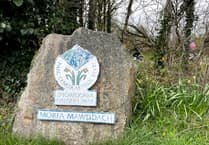The scrapping of a multi-million pound bypass will make it harder to attract inward investment into areas such as south Gwynedd, according to the county’s economic chief.
Despite planning permission and funding being in place, last month saw the Welsh Government scrap plans for the £14m Llanbedr bypass following advice from a committee of transport and climate experts.
Calls for the one-mile Llanbedr access road date back to the 1960s, with hopes the new route would ease congestion and cut traffic through the village by 90 per cent, while improving access to the nearby Snowdonia Aerospace Centre based at a former RAF base.
With the withdrawal sparking accusations of “betrayal”, deputy minister for climate change, Lee Waters, says he’s asked officials to work with Gwynedd Council to develop alternative transport solutions in the area which also houses one of Europe’s biggest campsites at Mochras (Shell Island).
Gwynedd Council has since confirmed it is exploring legal options, but a new report has also noted the challenges facing the county as efforts continue to kick-start the economy following several bumps in the road.
Presented to the Education and Economy Scrutiny Committee, it noted that while unemployment rates in Gwynedd had been below the Welsh average, there were challenges in terms of the seasonal nature of employment and low wage rates.
But it added that the resulting impact of the Coronavirus pandemic and leaving the EU has led to an “exceptionally tempestuous” 18 months.
Cllr Gareth Thomas, who holds the economic development portfolio, told members: “We’re looking at Gwynedd’s economy and there’s seasonal and agricultural work which traditionally doesn’t pay that well, but we have a programme to create high vale employment and we’ve been working hard to attract jobs of real quality to Gwynedd and keep our young people here.
“But decisions, especially the Llanbedr bypass, have pulled the rug out from under us.
“Llanbedr was one of the areas we were looking at, so the decision not to go ahead with the road and improve access to the aerospace centre means it will be very difficult for us to attract companies and invest in such an area.
“Some of the things noted in the report more or less makes it clear they’re (Welsh Government) turning their backs on rural areas, which drives me crazy.
“We really need high value jobs in our rural areas to retain our young people, not to mention allowing them to secure mortgages.
“The Welsh Government has to wake up, it seems to be concentrating everything on the towns and cities while here in rural Wales we’re struggling to attract investment.”
Nearly 200 people turned up at the Llanbedr Airport hangar last Friday to voice their opinion on the scrapping of the bypass, with local councillor Annwen Hughes confirming that “feelings remain high”.
Following the meeting, council leader Dyfrig Siencyn said: “The economic and community impact of not developing this road is huge.
“Due to these elements and a number of other ill-considered facts, I have asked our legal team to consider the validity of our legal options to the deputy minister, Lee Waters’ decision, to cancel the Welsh Government’s financial contractual commitment to the scheme.”
With almost £1.7m having already been spent on the bypass to date, Senedd Member Mabon ap Gwynfor remains adamant that fewer cars sitting idle or crawling through the village would result in an overall CO2 reduction.
“Refusing the development on environmental grounds is scientifically questionable as Gwynedd Council’s evidence clearly shows that significant carbon emission savings can be made by developing a bypass and reducing the speed,” he added.
“The populated urban areas have made significant investments in their infrastructure over the decades, which has led to attracting wealth and quality jobs to their areas.
“This investment on the Ardudwy coast is small compared to what these larger areas receive, but this is absolutely necessary.
“The residents of Llanbedr have a just cause here, to benefit their health, safety, and community well-being. The need for the bypass is clear.”
Addressing scrutiny committee members Sioned Williams, the council’s Head of Economy, added, “As parents we know that young people want to experience living elsewhere in order to gain new experiences, but the important thing is that we’re able to offer opportunities in order to attract them back.
“The main weakness of Gwynedd’s economy is the lack of variety in terms of jobs, and that was the main aim of efforts in Llanbedr and Trawsfynydd to try and allow families to stay in the area.”
The Welsh government said: “We’re committed to working collaboratively with Gwynedd to develop sustainable solutions to address the issues surrounding traffic in the village and access to the airfield, such as those suggested in the panel chair’s report.”





Comments
This article has no comments yet. Be the first to leave a comment.